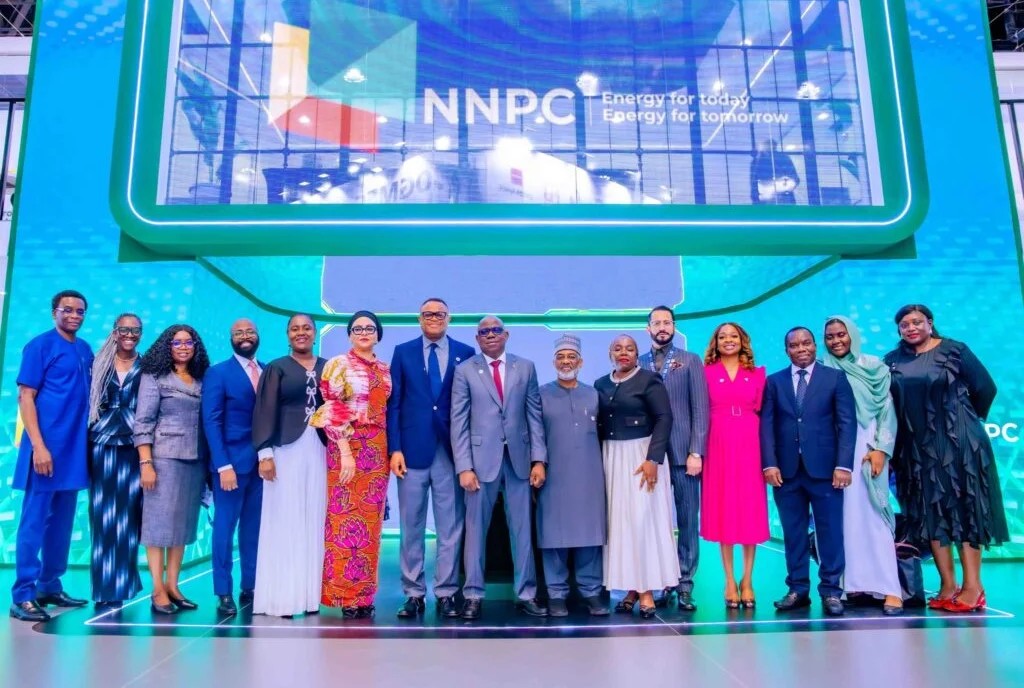NNPC Charts Path to 2 Million Barrels per Day by 2027, Eyes 3 Million by 2030

Nigeria’s crude oil production trajectory is set for a major rebound, as the Nigerian National Petroleum Company Limited (NNPC Ltd.) projects a ramp-up to 2 million barrels per day (bpd) by 2027, and 3 million bpd by 2030 — a bold plan that places Africa’s largest energy producer firmly on the path to sustainable growth and global competitiveness.
This was disclosed by Mr. Udy Ntia, Executive Vice President, Upstream, NNPC Ltd., during the 2025 Abu Dhabi International Petroleum Exhibition and Conference (ADIPEC) — the world’s premier energy forum themed “Energy. Intelligence. Impact.”
Ntia’s presentation, titled “Beyond the Barrel: The Future of Upstream Strategy,” underscored how Nigeria’s next oil boom will be defined not merely by volumes, but by efficiency, innovation, and decarbonisation.
“Nigeria’s upstream sector is evolving through a mix of collaboration, co-investments, and smarter capital deployment — not competition,” Ntia stated. “It’s not just about producing more oil; it’s about producing better oil — more efficient, cleaner, and more profitable.”
NNPC’s Upstream Vision: From Extraction to Transformation
At the heart of NNPC’s 2027–2030 roadmap is a technology-led upstream expansion strategy designed to achieve three simultaneous goals:
- Boost crude output,
- Cut emissions, and
- Maximise profitability.
Ntia revealed that Artificial Intelligence (AI), data analytics, and digital field technologies are now central to Nigeria’s upstream optimisation efforts — helping to squeeze more value from mature assets and streamline capital allocation.
“Technology is our growth engine. We’re deploying AI to drive operational efficiency, reduce costs, and guide smarter investment decisions,” Ntia said.
He identified three global forces redefining upstream strategy — energy transition pressures, industry fragmentation, and technological disruption — arguing that Nigeria’s approach must balance climate responsibility with development imperatives.
Decarbonisation Without Deindustrialisation
While many Western producers race to phase out fossil fuels, NNPC’s position is pragmatic: Africa, contributing less than 3% of global emissions, must pursue responsible production rather than abrupt cessation.
Ntia emphasised that Nigeria’s energy transition plan is rooted in gas monetisation, flare reduction, and carbon efficiency — not in halting hydrocarbon exploration.
Key decarbonisation and expansion initiatives include:
- Nigeria–Morocco Gas Pipeline Project – a transcontinental energy corridor linking Nigeria to North Africa and Europe.
- Domestic gas infrastructure expansion – connecting western and northern demand hubs to ensure reliable supply.
- Refinery modernisation and hybrid co-investment models – to optimise value addition from crude production.
“We can decarbonise and still produce responsibly,” Ntia noted. “The transition for Africa must be just, equitable, and growth-oriented.”
The Rise of Partnership-Driven Oil Growth
NNPC’s evolving business model reflects a shift from state monopolisation to co-investment partnerships — a pragmatic response to capital constraints and global funding pressures facing fossil energy.
“Co-investment is the new round of financing,” Ntia said. “We’re partnering with both International Oil Companies (IOCs) and indigenous independents to ensure projects are bankable and quickly executed.”
He dismissed the outdated notion of competition between NOCs and IOCs, describing modern partnerships as symbiotic ecosystems where shared profitability drives sustainability.
“IOCs are not competitors; they are collaborators. The real question is how we can grow the size of the pie so that everyone wins.”
BRANDECONOMY ANALYSIS: Can Nigeria Hit Its 2 Million Barrel Target?
From an industry perspective, NNPC’s upstream roadmap is both visionary and pragmatic, but its success will depend on a few critical factors:
- Security and Infrastructure Stability
Persistent pipeline vandalism, crude theft, and community unrest remain Nigeria’s biggest threats to production. Without sustained security reform and investment in surveillance technology, hitting 2 million bpd could remain aspirational. - Regulatory Consistency and Fiscal Clarity
Nigeria’s Petroleum Industry Act (PIA) has restructured the oil sector, but investors still seek consistent implementation and reduced bureaucratic delays to unlock capital inflows. - Capital and Technology Partnerships
By embracing joint ventures and private equity-backed co-investment, NNPC can de-risk new upstream projects and accelerate development timelines. - Energy Transition Diplomacy
As global financiers pivot away from hydrocarbons, Nigeria’s diplomatic and strategic engagement will be key in securing transition-aligned funding that supports gas and cleaner oil projects.
If executed effectively, this NNPC strategy could reposition Nigeria as Africa’s premier energy hub — a vital supplier of low-emission hydrocarbons and a leader in regional energy security.











